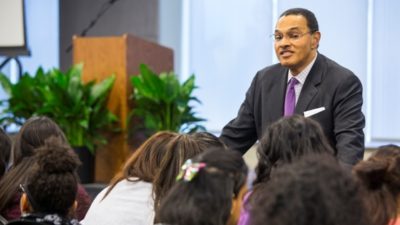Expert promotes critical thinking skills
Too many people – especially Americans – focus on getting the “right” answer to a question, and doing so as fast as possible.
A better goal, according to Freeman A. Hrabowski III, is to focus on the process for figuring out the answer. The questions change, but the process of analysis and critical thinking is a constant.
That was a big part of the message Hrabowski brought to the 2015 Urban Education and Community Forum sponsored by the School of Education at the University of Missouri-Kansas City.
Hrabowski, president of the University of Maryland, Baltimore County since 1992, was named by President Barack Obama to chair the newly created President’s Advisory Commission on Educational Excellence for African Americans. Hrabowski also chaired the National Academies’ committee that produced the recent report, “Expanding Underrepresented Minority Participation: America’s Science and Technology Talent at the Crossroads.”
Billed as a champion of STEM (science, technology, engineering and math) education, Hrabowski also proved to be a powerful advocate for high, broad and open expectations of young people. Too often, he said, we push young people into stereotypical paths long before they have a chance to develop their interests or demonstrate their capabilities.
“In America, we believe problems have to be solved like that,” he said, snapping his fingers. “In real life, many problems are not solved quickly.” The real value in education, he said, is to teach people to use the process of analysis to solve problems.
“I’m more interested in the process than in the answer,” he said. “The education is in the struggle.”
When people have been raised to be critical thinkers, he said, transformation is possible. He talked about the dramatic increase in people earning college degrees since the 1960s – from 10 percent to 30 percent of all Americans.
“But: half of the kids who start college don’t finish,” he added. Now that expectations have been raised, communities and universities must work together to bring more young people through to complete their degrees.
It’s a process that involves the colleges, he said, but must begin with pre-kindergarten programs that research has shown are vital to developing young minds for future learning.
A key role for both programs and parents, he said, is to encourage curiosity in children.
Most parents who try to be positively involved in their children’s educations will ask questions like, “What did you learn today?” A better question that one mother asked regularly, he said, was, “Did you ask a good question today?”
Another vital skill for future success is collaboration, Hrabowski said, especially across disciplines. He said he encourages STEAM over STEM, adding Art to the mix. An example is his university’s award-winning and nationally competitive student Game Development Team, which includes students majoring in art, engineering and computer science, working together toward a common goal.
Hrabowski also praised the value of hope. He said the lesson of the civil rights movement – which he lived through growing up in the segregated south during the 1950s and ‘60s – is that “the world of tomorrow does not have to be the world of today. Things can get better.”
With hope, a community can believe that all children can achieve in school, and in life.
“I challenge this community, and I challenge UMKC: Never, never give up hope. All things are possible.”

